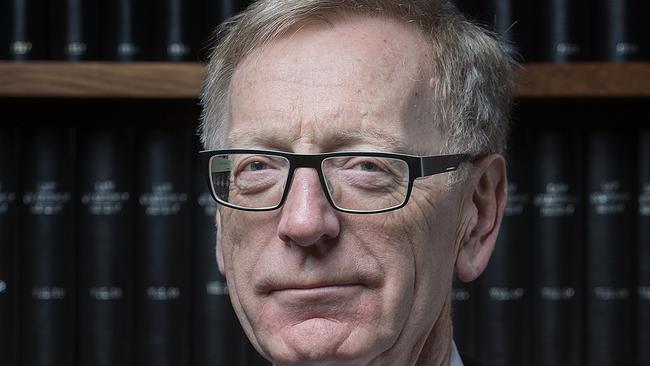Bank royal commission: banks warned against gagging complaints
Banks have been warned by a royal commissioner against trying to gag submissions, and face questions about missed deadlines.

Banking royal commissioner Kenneth Hayne has backflipped on a warning against financial services victims or whistleblowers breaching gag orders in submissions to the inquiry.
Opening the commission in a small, packed courtroom in Melbourne this morning, Mr Hayne also said he would be looking into why some banks and other financial services industry players he had asked for more information about their misconduct over the past five years had advised they would fail to meet a deadline of 4pm tomorrow.
The commission last week advised that submissions should not include material that breaches nondisclosure or non-disparagement clauses in deals settling their disputes with the industry.
However, Mr Hayne warned today that any institution that tried to enforce a gag clause against a person giving a submission faced “immediate consequences”.
These consequences were the “closest attention” to the specific case, likely including the exercise of the commission’s powers to compel evidence and documents, and an examination of the institution’s motives in trying to keep the information from the commission.
Mr Hayne said he first wrote to financial services companies on December 15 last year asking for a 50-page confession of misconduct and conduct that failed to meet community standards over the past 10 years.
He said that on February 2 he asked for “more specific information about misconduct”.
“It has been said that the deadline cannot be met because of the amount of material to be reviewed and assembled,” he said.
He said that given the institutions had already provided information on 10 years of both misconduct and behaviour not meeting consumer expectations, this stance might need “further attention”.
“Whether it is will be a matter for debate at a later time,” he said.
Financial services royal commission staff were forced to open overflow rooms for the public — and some of the lawyers attending on behalf of their financials services industry clients — after the tiny 64-person-capacity main courtroom quickly filled to capacity.
Counsel assisting Rowena Orr told the commission she had a large staff but there was a lot of work to do.
“The terms of reference in the letters patent are broad, and the time to report is short,” she said,
She said the commission’s first public hearing, to be held in about a month’s time, would concentrate on consumer lending including home loans, credit cards and car loans.
Material so far uncovered by commission staff suggested home loan customers had not always been treated “honestly or fairly” and there may have been breaches of the law, she said.
She said the commission would attempt to uncover “how and why were such events were permitted to occur and what steps were taken at the time or have since been taken to address those events.”
The royal commission was announced in late November by Prime Minister Malcolm Turnbull, who had long denied the need for such an inquiry, after the bosses of the big banks wrote to him asking for one.
Mr Turnbull’s backflip followed years of scandals in the banking sector including shoddy financial advice, insurance ripoffs and rate-fixing, many of which involved Australia’s biggest bank, the Commonwealth Bank.
The scandals fuelled parliamentary inquiries and repeated calls for a royal commission from Labor, the Greens and elements of the Nationals.
Commissioner Hayne has been charged with investigating a wide range of issues in an extremely tight time frame.
He is to probe potential misconduct — including criminal behaviour — within the financial services sector, the use or misuse of members’ money by super funds, governance, risk management and remuneration practices and the adequacy of existing laws and regulators.
The commission cannot order compensation for victims of misconduct.
An interim report is required by the end of September and a final report by February 1 next year.




To join the conversation, please log in. Don't have an account? Register
Join the conversation, you are commenting as Logout